Fozia Choudry doesn’t often tune in to Pakistan’s test cricket matches, but when faced with making 5,000 samosas she finds it helps pass the time.
That, or she loses track of what’s on the television as she carefully handcrafts them one by one ahead of Ramadan.
Fozia is the owner of Fozia’s Kashmiri Street Kitchen. The business only moved to the container village on Lodge Lane in July last year, but it’s already cemented itself alongside the many other popular institutions that line the road.
READ MORE: Shipping container village that's 'changing the face of Lodge Lane'
If customers aren’t stopping to buy some of its famed samosas or pakora burgers, passers by are popping their head in to catch up with Fozia. The small serving space at the front of the container is a busy revolving door of friends, food and characters from across the local community - complete with the aromatic flavours simmering away in the back of the kitchen.
Working away in the back is Fozia’s colleague, Sonia Ashraf. It’s early afternoon and a base of onions is simmering away in one pot while a large pan of Aloo Gobi bubbles away in the other. Sonia carefully sprinkles spices into the pot of curry.
It’s particularly warm for March, and the heat inside is only intensified by the corrugated iron kitchen. Knowing this, Fozia has thought ahead and brings the temperature down with a batch of mango lassi, a yoghurt based drink, fresh from the blender.

The pair are dealing with the daily custom, but Fozia also has one eye on the start of Ramadan. “There's a lot of preparation that will go on beforehand, before the fasting month even starts,” Fozia tells the ECHO, tuning to drop a portion of thick cut fries into the oil fryer.
While the holy month is largely characterised by fasting [in most cases practising Muslims will fast from 5am to 8pm], food and how it brings communities together is just as important, Fozia explains. She says some families will prepare dishes a month ahead of Ramadan. Others will take weeks to make food solely to deliver to other families and friends. In Fozia’s view, after breaking fast with dates and water, it’s difficult to top a samosa. But a range of curries and Kathi kebabs are also favourites on the menu most nights.

Fozia does catering alongside running her kitchen and delivers frozen homemade curries across the country. Making food in large quantities is almost second nature. But it’s not so different for the large majority of Muslim households - who take it in turns to host a wide range of friends and family of an evening to break fast.
Fozia told the ECHO: “During Ramadan, as a child, my mum would always go all out. It would be like a small party every single night. Any treats we wanted, we would get.
“That was my childhood. That was because my mum would be encouraging us to fast and it would be something for us to look forward to. I know a lot of mums would do that for their children.”
She added: “The food and its preparation is a massive part of Ramadan. Every household will serve out food to everybody. If you feed a fasting person there is so much blessing involved.
“It's a really special month. The fasting part is the important part. But people do look forward to the food because people will make all of their favourite treats.”

As well as preparing mountains of samosas for various events and families, Fozia’s Street Kitchen will also be sharing some Ramadan specialties by delivery.
The ‘Iftari boxes’, Fozia explains, will be for friends and families to quickly break fast together - leaving people more time to prepare mains like curries for later in the night. Inside the pizza style boxes there will be “a bit of everything”, from “chicken tandoori, fish pakoras, kebabs, samosas, chips.” Fozia adds: “Loads of little treats that will fill you up.”
Having fasted for 30 days, does your approach to food change at all for the rest of the year, the ECHO asks Fozia? “Not at all,” Fozia laughs, “it takes like a day and you're back to normal."
Emira, one of Fozia’s friends standing at the shop front, pitches in: “It makes you realise how you don't need that much and how you completely over indulge throughout the rest of the year. But you feel very justified to celebrate Eid when you've been fasting for a month. You feel like you've earned it”.

The fasting side is best seen as “work” however, as Fozia explains. She adds: “We're used to it. You just get on with it. It's mind over matter.”
While fasting is the core part of the holy month, the hours when the fast is broken remain just as integral - moments when you can learn the most about your neighbourhood and community. Fozia told the ECHO: “So many people will offer me food. My fridge gets so full and I stop cooking after a while. I usually end up with three days of food in my fridge.
“People will just drop stuff off at your door. There are so many nationalities and the food always reflects that.
"You can learn a lot about your neighbours and family through food.”







